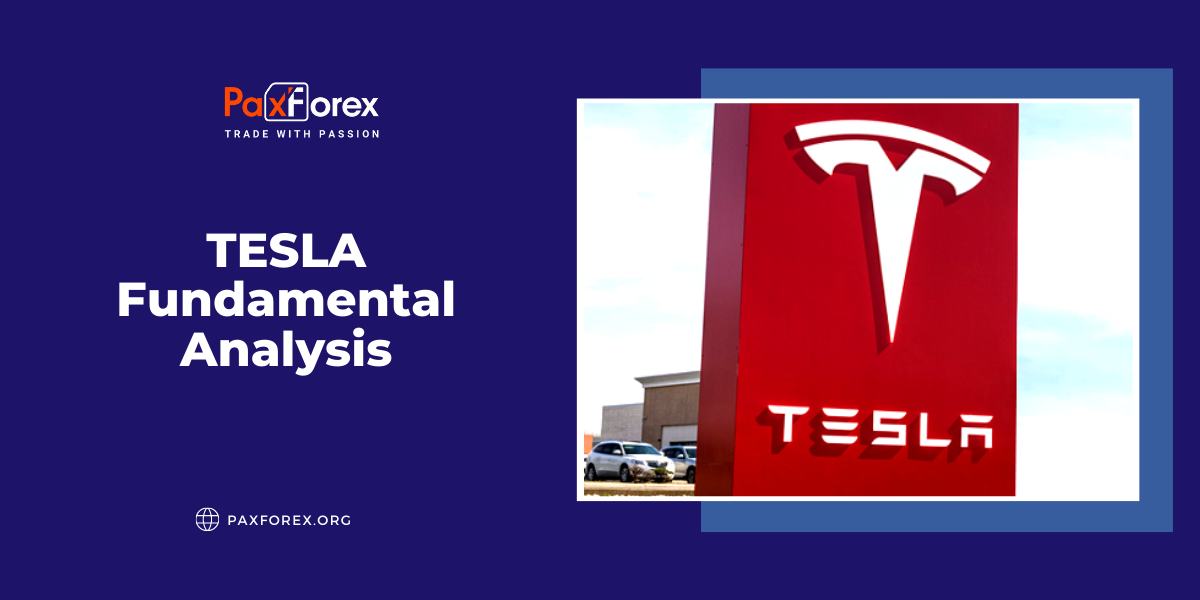
Source: PaxForex Premium Analytics Portal, Fundamental Insight
For many investors, Tesla is nothing more than an automaker. For others, it is a company of revolutionary innovation, which in reality can rather be compared to technology corporations or even luxury goods manufacturers. Let's take a close look at Tesla's fundamentals and try to figure out whether this company is worth investing in at current levels.
Tesla, formerly known as Tesla Motors, Inc., designs, develops, manufactures, and sells electric motor vehicles and energy storage systems, and installs and operates, and maintains such systems. The company's operations are divided into two segments, automotive and energy generation and storage systems.
The automotive segment includes the design, development, manufacture, and sale of electric vehicles. The energy generation and storage segment is responsible for the design, manufacture, installation, and sale or leasing of energy-efficient solutions and photovoltaic systems for residential and commercial applications.
Tesla manufactures and sells the Model S sedan, Model X SUV, and Model 3 mass-market sedan. In addition, the company develops electrical products for homes, commercial spaces, and public spaces.
Let's start with the financial history, from which some useful information can be gleaned.
Let's pay attention to the trend of revenue and profit growth over time, especially profits. After years of blaming the company for growth without profits, Tesla is now earning profits. Margins go up and down, but they never deviate from the 15-20% range of revenue.
The growth rate in diluted earnings per share over the past three years has been as high as 315%, a figure that is truly impressive.
But let's not forget that, like other companies, Tesla's performance will eventually come to more normal levels. So we as investors need to think about how much the company will be worth then.
Tesla has over $22 billion in cash and short-term investments. Total assets are about $41 billion. This means an excellent short-term balance sheet compared to current liabilities ($27 billion).
The debt-to-equity ratio is good at 0.78 (we consider 0.5/0.6 or lower to be optimal).
When it comes to cash flow, the operating cash flow trend is upward, reflecting Tesla's recovery over the past couple of years.
The company's latest free cash flow is $14.7 billion and yields about 2.5%. Given these numbers, Tesla stock is unattractive at current levels, despite a good growth trend.
In terms of valuation, the stock currently trades at a discount of just under 15% to its fair value of about $221 per paper (based on the average of 12 different models).
Analysts are more conservative for now: their average price target is $207, which implies a potential upside of about 8%.
The company as a whole has the potential for further growth. However, with other automakers gradually investing in electric vehicles and looking for answers to all of the industry's pressing questions, Tesla's growth could slow down in the coming years, causing its valuations to become overvalued again.
Right now, Tesla stock is worth holding in your portfolio. But you wouldn't call them particularly cheap. Most analysts also have concerns about management. Elon Musk is certainly a genius, but shareholders will always worry that he could sell his stock at any time given, among other things, his involvement in other projects like Twitter.
As long as the price is above 167.00, follow the recommendations below:
- Time frame: D1
- Recommendation: long position
- Entry point: 193.13
- Take Profit 1: 200.00
- Take Profit 2: 217.00
Alternative scenario:
If the level of 167.00 is broken-down, follow the recommendations below:
- Time frame: D1
- Recommendation: short position
- Entry point: 167.00
- Take Profit 1: 154.00
- Take Profit 2: 139.00













